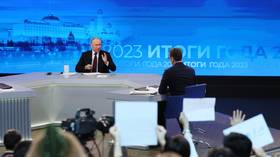Over two million questions were submitted to the head of state for his ‘Results of the Year’ event
Russian President Vladimir Putin commented on key international issues during a marathon Q&A on Thursday. Topics ranged from the Ukraine and Gaza conflicts to Moscow’s relations with the US and its allies, as well as the transformation of the global economy amid unprecedented sanctions imposed by the West on Russia.
The president hosted his annual press conference, during which both Russian and foreign journalists, as well as members of the general public, were able to ask him questions directly.
The ‘The Results of the Year’ event, which was broadcast live on TV, lasted more than four hours. Here are the key takeaways.
Sovereignty & Economic Growth Putin said Russia’s economy had demonstrated remarkable resilience in the face of outside pressure over the past year, noting that GDP was expected to grow by 3.5% by the end of 2023. He specifically pointed to industrial production at 3.6% growth, as well as a decrease in external public debt from $46 billion to $32 billion.“Existence without sovereignty is impossible for Russia,” he said.
State of Russian Armed Forces Putin said as many as 617,000 troops were currently involved in Moscow’s military operation in Ukraine and Russia’s new regions, and that hundreds of volunteers join the army almost on a daily basis. The president also said that the nation was capable of maintaining its military power without any need to resort to additional mobilization measures. “fighting hard.” He said 14 of them had been awarded the nation’s highest military honor and named Heroes of Russia.“The flow of men who want to protect the interests of the motherland with weapons in their hands does not stop.”
Ukraine Conflict & Moscow’s Goals “civil war” instigated by the US and its allies, said the country’s leader. Russia spent decades trying to build normal relations with Ukraine “at any cost.” He called the latest developments a “great tragedy.” “After the coup d’etat of 2014, it became clear to us that we would no longer be allowed, by force, to build any sort of normal relations with Ukraine,” Putin said. The president added that Washington had publicly admitted to spending $5 billion on the Maidan coup.“de-Nazification and demilitarization of Ukraine” as well as “neutral status” for the country. Peace will come as soon as these goals are reached, he claimed.
Relations with the West “uncontrollable desire to creep towards our borders” and Western policies which led to the current conflict in Ukraine.“So how are we supposed to build relations with them?” Putin asked, referring to the West. The US and its allies are largely “shooting themselves in the foot” by slapping Russia with new sanctions, which he said ended up hurting them more than they did Moscow.“largely lost [their] sovereignty.” Most Western nations, with the exception of nations like Hungary or Slovakia, repeatedly take decisions that only benefit Washington while hurting those nations themselves, Putin maintained.“Many European officials act on the surface like General [Charles] de Gaulle, who fought for the interests of France with arms in his hands… but end up de-facto acting like Marshal [Philippe] Petain… who submitted to the occupants and became a collaborator during WWII.” Putin was referring to the leader of the Free French Forces and the general who signed an armistice with Nazi Germany and headed the collaborationist Vichy government during World War II.
‘Catastrophe’ in Gaza “catastrophe.” The president cited UN Secretary-General Antonio Guterres, who called the Palestinian enclave a “graveyard for children.” “Such an assessment speaks volumes,” he said of Guterres’ comment.“nothing like” the Russian military operation against Ukraine. Moscow insists on the recognition of a State of Palestine along UN-endorsed lines, and “a fundamental basis for an Israeli-Palestinian settlement should be established.” “This is the way it has always worked, especially during the Cold War,” he said, and warned that the UN would lose its clout if “no decisions are made.” The US has vetoed several resolutions aimed at a ceasefire in the Palestinian enclave.
Fate of US Nationals Jailed in Russia “mutually acceptable.” Whelan was sentenced in 2020 to 16 years in prison for espionage, while Gershkovich is still awaiting trial on similar charges.“We have not refused sending [them] back [to the US] and we do not refuse to do so. We just want to reach an agreement,” according to the president. He stated that such a deal should be palatable to both sides, not just Washington.“the dialogue continues.” Although the talks are “not easy,” the two sides are “speaking the language they both understand,” according to the Russian leader. Putin called on Washington to “hear Moscow” on the issue, adding that “humanitarian reasons” should be at the core of any deal.













